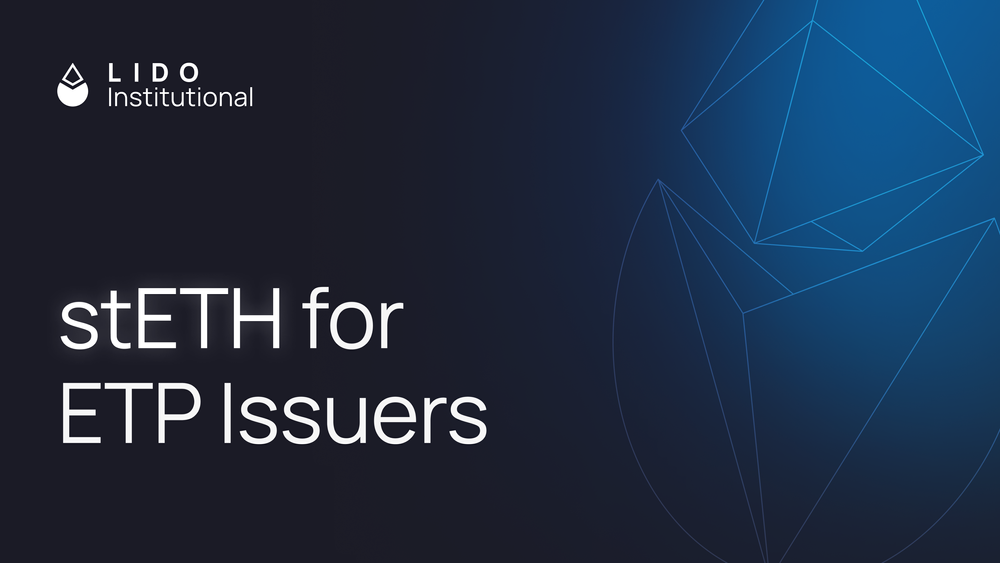stETH for ETP Issuers

The world of exchange-traded products (ETPs) is evolving rapidly, driven by investor demand for innovation, high-rewards, and accessible options. As Ethereum staking continues to grow in prominence, stETH, Lido protocol’s liquid staking token is emerging as an alternative for ETP issuers. By combining staking rewards with liquidity and utility, stETH offers a unique value proposition that can set ETPs apart in a competitive market.
Why is stETH different
Staking Rewards
Ethereum staking traditionally involves a significant trade-off: investors can get staking rewards, but their staked ETH becomes locked and inaccessible. This lack of liquidity limits usability and can deter participation, particularly for those who value flexibility. Furthermore, redemption requests from native staking can face delays or uncertainties due to network withdrawal limits, adding another layer of complexity.
stETH eliminates these barriers by offering holders liquidity, accessibility, and exposure to staking rewards. It reflects the value of the staked ETH and accrued network staking rewards. These tokens are created upon staking and destroyed when redeemed, with balances adjusted daily based on oracle reports. Users can hold stETH, swap it, or deploy it in decentralized finance (DeFi) without relinquishing participation in Ethereum’s consensus mechanism (thus getting staking rewards) or worrying about unpredictable redemption timelines.
By integrating stETH, issuers can offer unique products that benefit from Lido protocol’s middleware solution to get network staking rewards while avoiding the limitations of native staking.
Liquidity
stETH is the most popular liquid staking token, and the Lido protocol is a prominent liquid staking protocol, with a ~$30bn TVL (Total Value Locked).
Moreover, the validator network on Lido protocol is being actively decentralized, through initiatives such as Lido’s Community Staking Module (CSM) - a permissionless staking module aimed at attracting community stakers to participate in the Lido on Ethereum protocol as node operators. Follow the link for a detailed overview and description of CSM.
Accessibility
stETH is designed to be accessible , and is supported across major exchanges, DEXs, and institutional-grade custody solutions like Fireblocks, Ceffu and Taurus. This broad compatibility ensures that stETH can be easily integrated into ETPs, providing a seamless experience.
Additionally, stETH boasts deep liquidity across markets, which is crucial for maintaining smooth trading and ensuring investors can buy or sell their ETP shares with minimal friction.
Expanding ETP Utility with DeFi Integration
stETH isn’t just a receipt token — it can also be used with various third-party DeFi applications that have independently integrated and support it. Its compatibility with DeFi protocols enables innovative use cases that can enhance the utility of an ETP. For example, stETH could be used to enable collateralization, or other advanced use cases within the ETP structure.
This flexibility future-proofs products built on stETH, allowing issuers to adapt and expand their offerings as the market evolves.
Differentiate Your ETP Offering
Incorporating stETH into an ETP isn’t just about providing exposure to Ethereum's staking rewards – it’s about differentiation. stETH offers unique benefits that traditional staking or other crypto assets can’t match, from liquidity and accessibility to DeFi utility.
By integrating stETH, issuers can create products that may stand out in the crowded ETP market, attracting innovation-driven investors.
Contact Lido Institutional to learn how stETH can differentiate your ETP offerings.
Disclaimer: All information provided herein is purely for informational purposes and does not constitute an offer, recommendation or solicitation to participate in any activity involving crypto assets. References within this website to any specific commercial product, process, or service, or the use of any trade, firm or corporation name is for the information and convenience of the public, and does not constitute endorsement, recommendation, or favouring in any form or shape. Any decision to participate should be based solely on your own due diligence and should be made only after consulting with your own legal, financial, and tax advisors.